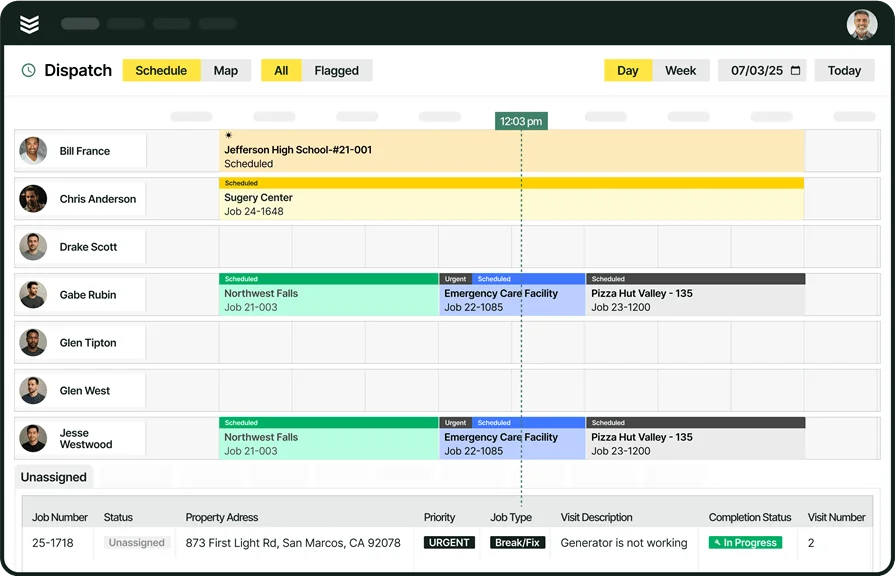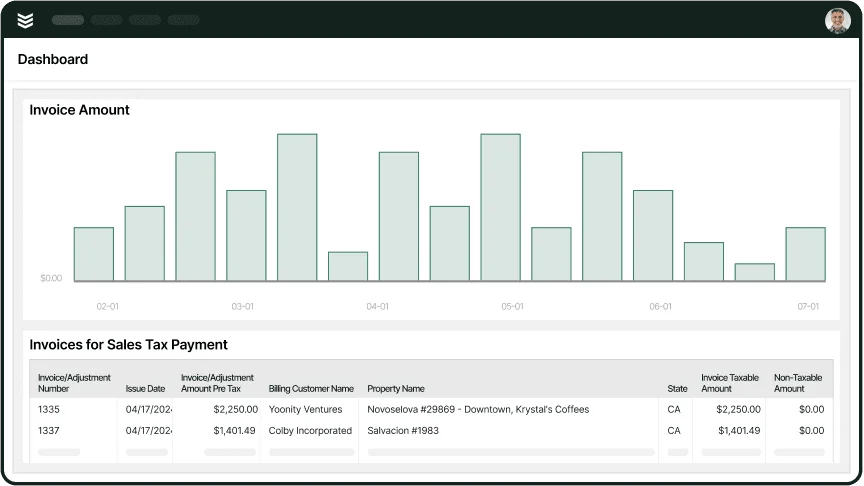Field service pros don’t have time for guesswork. Whether you're running a commercial HVAC outfit, managing a team of electricians, or keeping a plumbing business on track, you need tools that work as hard as you do. That’s where the right field service management (FSM) vendor comes in. A good FSM vendor isn’t just selling software—they’re a partner, helping you schedule jobs, dispatch techs, manage work orders, and keep cash flowing.
But with so many options out there, how do you pick the best one for your business? This guide breaks it down. We’ll cover:
- How to choose the right field service management vendor
- 6 key features to look for in a field service management vendor
- Best field service management vendors
- 7 benefits of using an FSM software from a reliable vendor
- 4 important field service management vendor FAQs answered
Not all FSM vendors are built the same. Some cater to small businesses, while others are designed for enterprise operations. Some focus on residential services, while others are better suited for commercial contractors. The key is knowing what to look for.
How to choose the right field service management vendor
Picking the right FSM vendor is more than just chasing the biggest name or the flashiest features—it’s about finding a system that fits the way your team works. The right software should make jobs easier, not add more headaches. Before committing to a vendor, ask yourself:
- Ease of use – Can your techs and office staff pick it up quickly, or will it take weeks of training? A system that slows your team down isn’t worth the hassle.
- Scalability – Will the software still work as your business grows? Or will you outgrow it in a year and have to start from scratch?
- Integration – Does it work with the tools you’re already using, like QuickBooks or inventory management systems?
- Support & training – When you hit a snag, is there solid customer support? Do they offer onboarding, or do they just hand you the software and wish you luck?
- Essential features – Can it handle scheduling, dispatching, invoicing, and job tracking? Are the key features built for the field service industry, or is it a generic tool trying to do it all?
A good FSM vendor makes sure their system works for you. The next step? Looking at the must-have features that separate a great FSM solution from one that just looks good on paper.
6 key features to look for in a field service management vendor
Running a field service business is like managing a moving puzzle—technicians on the go, last-minute schedule changes, and customers expecting fast service. The right field service management vendor takes the chaos out of your day.
Take a commercial HVAC contractor, for example. Their team juggles service calls across multiple locations, each requiring specific skills and equipment. Without a vendor that provides the right FSM tools, double bookings happen, techs show up unprepared, and jobs run over schedule. That’s why choosing an FSM vendor with the right features is critical. Here are the six must-have features every field service business should look for when evaluating FSM vendors:
1. Scheduling and dispatching
When jobs pile up, and your team is stretched thin, efficient scheduling and dispatching keeps everything running. A good FSM vendor provides real-time visibility into technician availability, skill sets, and job urgency, ensuring the right tech gets to the right job without delays. Say for example, a plumbing company gets an urgent pipe burst call in the morning, but their dispatcher is juggling multiple appointments. A field service scheduling tool that automates dispatching and job assignments means the nearest qualified tech is sent out immediately—saving time, reducing water damage, and keeping the customer happy.
2. Technician mobility
Your technicians aren’t sitting behind desks—they’re out in the field. A strong FSM vendor provides a mobile app that lets techs access schedules, customer history, and job details right from their phone or tablet. Imagine an electrical contractor responding to a service request at a commercial property.
The building’s maintenance team doesn’t have job details handy, but with a field service technician mobile app that syncs job info in real time, the electrician can pull up past service records, access blueprints, and log job notes without wasting time calling the office.
3. CRM and customer management
Keeping track of customers, service history, and follow-ups is just as important as completing the job. FSM vendors with built-in CRM tools ensure every customer interaction is logged, making it easy to manage contracts, warranty details, and service agreements.
For example, a commercial refrigeration company services multiple restaurant chains. Without a field service CRM software that centralizes customer data, their team risks missing preventive maintenance calls, leading to costly equipment failures. With the right CRM, they proactively schedule maintenance and strengthen customer relationships.
4. Invoicing and payments
The last thing you want is delays in getting paid. A good FSM vendor streamlines invoicing and payments, letting field service businesses generate invoices on-site, accept digital payments, and reduce billing errors.
Take a mechanical contractor completing a repair job. Instead of returning to the office to generate an invoice, a field service invoicing tool that allows instant digital billing lets the tech send the invoice before leaving the site. Faster billing means faster payments—and fewer headaches chasing down overdue invoices.
5. Fleet and asset tracking
Your vehicles and equipment are the backbone of your business. An FSM vendor with fleet management capabilities helps track vehicle locations, fuel usage, and maintenance schedules—reducing downtime and preventing unexpected breakdowns.
Consider an HVAC company with a fleet of service vans. Without a field service fleet tracking system that monitors vehicle health and routing, they risk losing time on inefficient routes or unexpected mechanical failures. With the right tracking tools, they optimize routes, cut fuel costs, and keep their fleet road-ready.
6. Reporting and analytics
You can’t improve what you don’t measure. A solid FSM vendor offers reporting and analytics tools that track job completion rates, technician performance, and revenue trends—helping you make smarter business decisions.
For instance, a fire protection company wants to identify which service contracts are the most profitable. A field service reporting tool that breaks down job performance and profitability helps them spot inefficiencies, adjust pricing, and boost revenue.
Other features to look for from a field service management vendor
Beyond the must-haves, some features don’t always make the priority list—but they should. The right FSM vendor doesn’t just help you schedule jobs and send invoices. They also provide extras that give you a competitive edge, improve cash flow, and help your business run smoother.
- Service agreements - Locking in recurring revenue is key for any field service business. FSM vendors with automated service agreement management let you track, renew, and schedule preventive maintenance without relying on manual reminders.Take a facility maintenance company handling HVAC and electrical systems for multiple commercial buildings. Without a field service agreement tool that automates contract renewals and tracking, they risk missing service calls, leading to equipment failures and lost revenue. A system that keeps agreements organized ensures they never miss a billable visit.
- Job quoting and estimates - Winning more jobs starts with accurate, professional quotes. A strong FSM vendor provides a quoting tool that lets you generate estimates in the field, adjust pricing on the fly, and send proposals to customers in minutes. Imagine a plumbing contractor on-site for a leak repair. The customer asks for a quote on a full pipe replacement. Without a field service quoting tool that generates estimates instantly, the tech has to call the office, wait for approval, and risk losing the sale. A system that lets them build and send quotes from their tablet means they close more deals on the spot.
- Time tracking and payroll - Keeping track of labor costs manually is a nightmare. The best FSM vendors include time-tracking tools that log technician hours, automate payroll calculations, and reduce errors in billing. Take an electrical company with 20+ field techs. Without a field service time tracking system that integrates with payroll, they’re wasting hours manually reviewing timesheets and correcting errors. A system that logs hours in real-time ensures accurate paychecks, cleaner job costing, and fewer payroll disputes.
7 best field service management vendors
In field service, the right tools make all the difference—and that starts with the right FSM vendor. Whether you're running a commercial HVAC company, a small plumbing business, or a general contracting outfit, you need a system that fits how you work. The wrong vendor? That’s just another headache—bad scheduling, slow invoicing, and techs stuck waiting for job details. Below, we break down the top FSM vendors, each excelling in a different category—so you can find the right fit and keep jobs running smoothly.
1. Best field service management vendor for commercial: BuildOps
For commercial contractors handling large-scale service operations, BuildOps is the go-to FSM vendor. Designed specifically for commercial HVAC, electrical, plumbing, and mechanical businesses, it offers a full-service platform that streamlines scheduling, dispatching, work orders, and reporting—all while integrating with existing systems. Unlike generic FSM vendors, BuildOps is built for complexity. It handles multi-location service agreements, technician hierarchies, and commercial asset management without skipping a beat.
How Pricing Works: BuildOps offers pricing on a per-company basis, ensuring that businesses pay for the tools they actually need. The best way to understand the pricing structure and see how it fits your operation is to schedule a demo. Live demos are available weekly, or you can request one anytime for a closer look.
Features Beyond FSM: More than just scheduling and dispatching, BuildOps provides deep operational insights. Its advanced reporting tools break down job profitability, technician performance, and service contract efficiency—helping commercial contractors make data-driven decisions. Plus, AI-powered job tracking ensures every work order moves through the pipeline without bottlenecks.
Why It Stands Out for Commercial: BuildOps is built exclusively for commercial contractors. It handles multi-location service agreements, complex asset management, and technician job assignments—things that residential FSM vendors just can’t manage as well. If your business juggles large-scale service contracts and high-volume work orders, this is the FSM platform built for you.

Curious to see how it works?
We’re built for commercial contractors looking to streamline FSM and get jobs done.
2. Best software for residential: Housecall Pro
Image Source: Housecall Pro
Housecall Pro is a strong FSM vendor for home service businesses like HVAC, plumbing, and electrical, that simplifies scheduling, dispatching, invoicing, and customer management. It’s designed for smaller teams that need an easy-to-use platform to handle daily service calls. However, for contractors handling larger-scale commercial jobs, Housecall Pro may feel limited. It lacks the depth needed for multi-location service tracking and complex contract management.
How Pricing Works: Housecall Pro uses a tiered pricing model, starting with basic features and scaling up for additional tools. Plans typically range from $59 to $299 per month, depending on the level of functionality required.
Features Beyond FSM: Housecall Pro is built to help residential businesses grow. It includes automated customer follow-ups, online booking, and review generation, making it easy for residential service pros to keep their schedules full. Plus, its built-in postcard mailer lets businesses send physical reminders to past customers with just a few clicks.
Why It Stands Out for Residential: Housecall Pro is tailored for small home service teams that need simple, user-friendly tools. Its focus on customer engagement makes it a great choice for plumbers, electricians, and HVAC techs who rely on repeat business and word-of-mouth referrals.
3. Best for general contractors: Jobber
Image Source: Jobber
Jobber is a well-rounded FSM vendor designed for general contractors, landscapers, and cleaning businesses. It offers scheduling, quoting, invoicing, and job tracking—making it a great all-in-one solution for businesses that handle various service types. That said, Jobber is better suited for smaller contracting teams. Larger operations that need deep integrations with accounting, inventory, and asset management may find it lacking.
How Pricing Works: Jobber operates on a subscription model, with plans ranging from $29 to $149 per month based on the number of users and features required.
Features Beyond FSM: Jobber goes beyond job scheduling with tools that make running a business easier. It offers automated invoicing, quote follow-ups, and a client portal that lets customers book services and check job status without making a phone call. The built-in payment processor also helps contractors get paid faster.
Why It Stands Out for General Contractors: Jobber is built for businesses that handle diverse job types—from landscaping to home renovations. Its flexibility and ease of use make it a great choice for contractors who need a little bit of everything without overcomplicating their workflow.
4. Best field service management vendor for small business: Workyard
Image Source: Workyard
Workyard is a great option for small field service businesses that need precise labor tracking and simple scheduling. It’s built for contractors who want to reduce payroll errors, optimize technician routes, and control labor costs. In spite of that, as businesses grow, they may find Workyard lacking in advanced automation, deep reporting, and enterprise-level integrations, making it less ideal for large-scale operations.
How Pricing Works: Workyard offers a per-user pricing model, making it a cost-effective solution for small businesses. Plans start at around $6 per user per month for time tracking, with full FSM functionality available at higher tiers.
Features Beyond FSM: Workyard’s real-time GPS tracking, automated labor cost reports, and payroll integration help small businesses stay profitable without manual calculations. It’s ideal for teams that need to streamline payroll and reduce unnecessary expenses.
Why It Stands Out for Small Business: Workyard is perfect for small contractors who need a straightforward FSM solution. However, growing businesses may eventually need a more scalable FSM platform like BuildOps, which offers deeper reporting and automation for expanding operations.
Expert Tip
Small businesses can’t afford wasted time, missed jobs, or slow invoicing. The right FSM software helps streamline operations, improve cash flow, and keep customers happy. Learn more about how small businesses benefit from FSM software.
5. Best vendor for enterprise: Service Fusion
Image Source: Service Fusion
Service Fusion is built for large field service operations that require a centralized FSM system. It offers dispatching, invoicing, and customer management in one platform, making it a good choice for companies handling high-volume service requests. That said, it lacks the industry-specific automation and advanced asset tracking that commercial contractors often need. Businesses focused on multi-location service contracts may require a more specialized FSM solution.
How Pricing Works: Service Fusion follows a tiered pricing model, starting at $192 per month, with higher-tier plans available for larger teams needing more advanced tools.
Features Beyond FSM: Service Fusion offers VoIP phone integration, custom reporting, and multi-location job tracking, making it easier for enterprise teams to manage service operations at scale.
Why It Stands Out for Enterprise: This FSM vendor is best for businesses managing large fleets and high-volume jobs. Yet, commercial contractors may need a more tailored FSM solution like BuildOps, which provides commercial-specific automation, asset management, and AI-powered scheduling.
6. Best for construction professionals: Zuper
Image Source: Zuper
Zuper is a strong FSM option for construction contractors who need to manage long-term projects alongside service calls. It offers detailed work order tracking, workforce automation, and AI-powered scheduling, helping construction teams coordinate crews, manage subcontractors, and keep projects on track. That said, businesses that focus exclusively on short-term service contracts may find it more complex than necessary.
How Pricing Works: Zuper provides custom pricing based on the number of users and required features, making it flexible for small contractors and large construction firms alike.
Features Beyond FSM: Zuper includes AI-driven workforce optimization, contractor/vendor management, and integrations with construction-specific platforms like Procore, making it a great fit for companies handling both service jobs and project-based work.
Why It Stands Out for Construction: Zuper is designed for contractors balancing service work and large-scale projects. However, companies focused solely on high-volume service contracts may find a more streamlined FSM like BuildOps better suited for their needs.
7. Best field service management vendor for scalability: Workiz
Image Source: Workiz
Workiz is designed for fast-growing field service businesses that need scalable FSM software with call tracking, online booking, and multi-location job management. It’s a strong option for businesses expanding into new regions or rapidly increasing their workforce. Though, larger enterprises may find it lacks the deep automation, reporting, and workflow customization that more complex operations require.
How Pricing Works: Workiz operates on a tiered subscription model, starting at $198 per month for their standard package, with higher plans available for businesses needing advanced FSM features.
Features Beyond FSM: Workiz provides AI-driven chatbots, automated call tracking, and built-in marketing tools, helping fast-growing field service businesses scale their operations smoothly.
Why It Stands Out for Scalability: Workiz is built for businesses that need to expand quickly without disrupting daily operations. However, larger enterprises may require a more customizable FSM system like BuildOps, which offers industry-specific scalability and deeper workflow automation.

Get the software scoresheet
Compare top solutions at a glance with this easy-to-use scoresheet.
7 benefits of using an FSM software from a reliable vendor
Managing a field service business is tough enough—the last thing you need is a software that slows you down. A reliable FSM vendor doesn’t just handle scheduling and dispatching; it helps you cut waste, increase efficiency, and grow your business without the extra headaches. Here’s what field service businesses gain when working with a top FSM vendor:
1. Faster job scheduling and dispatching
Time wasted on manual scheduling is time that could be spent getting jobs done. With the right FSM software, dispatchers can see technician availability in real time, assign jobs instantly, and optimize routes to cut down on drive time.
For example, an electrical contractor handling emergency service calls can’t afford slow, outdated scheduling methods. A strong FSM system ensures the right tech is sent to the right job—without delays. Curious to learn more about this? Explore our guide to the 8 best FSM software that improve scheduling efficiency for contractors.
2. Increased first-time fix rates
Sending a tech to a job without the right tools or parts leads to unnecessary second visits. A reliable FSM vendor provides detailed job histories, customer records, and inventory tracking, ensuring techs show up prepared and ready to complete the work on the first visit.
Say a plumbing company dealing with repeat service calls because techs aren’t equipped with the right parts. With FSM software, dispatchers can match jobs with the right techs and make sure they have the correct materials before they arrive.
3. Faster invoicing and improved cash flow
Waiting weeks to send an invoice? That’s money sitting on the table. With built-in invoicing tools, FSM vendors let contractors generate invoices in the field, send them immediately, and collect payments faster.
Think of when a mechanical contractor no longer has to chase down unpaid invoices because FSM software automates payment reminders and integrates with accounting systems. The result? Less admin work and better cash flow.
4. Better customer experience and retention
A reliable FSM vendor makes customer interactions smoother, more professional, and more proactive. Automated appointment reminders, digital estimates, and customer portals make it easy for clients to track jobs, approve quotes, and make payments without hassle.
For instance, a fire safety company using FSM software can automatically schedule recurring maintenance visits, ensuring customers stay compliant without needing to remember service dates. Dive deep into the benefits of field service management software for businesses.
5. Reduced operational costs
Manual paperwork, inefficient job scheduling, and unnecessary truck rolls add up fast. FSM software streamlines workflows, reducing fuel costs, overtime, and wasted materials.
Take, for example, a refrigeration service company that used to send techs across town multiple times a day, burning fuel and labor hours. With FSM software, they optimized job routes, reducing mileage and cutting operational expenses significantly.
6. Real-time performance tracking and reporting
Knowing where your business is thriving and where it’s struggling is key to making smarter decisions. FSM vendors provide custom dashboards and reports that track job completion rates, revenue trends, and technician performance.
Consider a facility maintenance company that struggled to identify which service contracts were actually profitable. By using FSM analytics, they now break down job costs and fine-tune pricing strategies. Discover more about how different FSM solutions are shaping the industry.
7. Scalability for growing businesses
As your company grows, you need software that scales with you. A reliable FSM vendor provides multi-location support, flexible pricing models, and automation tools that keep operations running smoothly—even as workloads increase. A good example is a small HVAC company that started with just a few techs and quickly expanded into multiple service areas. Thanks to FSM software, they didn’t have to overhaul their operations—just added new users and automated scheduling adjustments to handle the growth. A reliable FSM vendor doesn’t just make daily tasks easier—it gives contractors the tools to build a stronger, more profitable business.
4 important field service management vendor FAQs answered
Field service management (FSM) vendors provide software solutions that help businesses schedule jobs, dispatch technicians, manage work orders, track inventory, and automate invoicing. Here are answers to the most common questions about FSM vendors and their software.
1. What is a field service management vendor?
A field service management vendor provides software designed to help service-based businesses streamline operations. These tools automate scheduling, dispatching, work order management, invoicing, and reporting—helping contractors, service techs, and business owners manage their teams efficiently.
FSM vendors cater to industries like HVAC, plumbing, electrical, fire safety, and mechanical services. The right FSM solution eliminates paperwork, reduces delays, and improves job tracking, making day-to-day operations smoother.
2. Who needs FSM software from a vendor?
FSM software benefits any business that manages a mobile workforce or schedules service calls. This includes:
- Commercial contractors (HVAC, electrical, plumbing)
- Residential service providers (landscaping, appliance repair)
- Facility maintenance teams
- Fire safety and security firms
- Mechanical and industrial service companies
Any business that struggles with scheduling, dispatching, invoicing, or job tracking can improve efficiency with an FSM vendor.
3. Are there any restrictions or compliance requirements when using an FSM software from a field service management vendor?
Yes, FSM software must comply with industry regulations and data security standards. For example:
- Data protection: FSM software must secure customer and business data, complying with GDPR regulations.
- Financial compliance: If the software handles payments, it must meet PCI DSS security standards.
- Workforce compliance: Some industries require certifications, safety logs, and time tracking for labor law compliance.
Businesses should ensure their FSM vendor meets specific industry needs, such as tracking EPA compliance for HVAC refrigerants or logging fire safety inspections.
4. What are some best practices for using FSM solutions from vendors?
To get the most out of FSM software, businesses should follow these best practices:
- Train your team – Ensure technicians and office staff know how to use the system
- Automate scheduling – Reduce delays by using smart scheduling and route optimization
- Sync with accounting software – Integrate FSM tools with QuickBooks or other accounting systems
- Use mobile apps – Equip technicians with mobile access for job details, customer notes, and invoicing
- Track KPIs – Monitor job completion rates, response times, and revenue trends
- Secure customer data – Follow cybersecurity best practices to protect sensitive information
- Customize workflows – Adjust job tracking, invoicing, and reporting to fit business needs
- Review and optimize regularly – Assess performance reports to improve efficiency over time
FSM software is only as good as how well it’s implemented. The best FSM vendors provide customization, automation, and mobile accessibility, helping businesses run smoother and scale faster.
Choosing the right FSM vendor comes down to what your business needs today—and where you see it going tomorrow. Some platforms focus on small teams, others cater to general contractors, and a few offer enterprise-level scalability. But not every FSM software includes the full suite of tools needed to handle the complex demands of commercial field service operations.
That’s where an all-in-one platform makes a difference. Many FSM solutions offer scheduling, dispatching, and invoicing, but few provide the depth of reporting, technician management, and service agreement tracking required for commercial contractors juggling high-volume operations.
If you’re looking for a field service management solution built specifically for commercial trades, BuildOps brings everything together—from real-time job tracking to AI-powered scheduling and deep reporting tools—all in one platform.

Take a closer look at BuildOps
Bring scheduling, dispatching, and invoicing together and keep everyone aligned.








